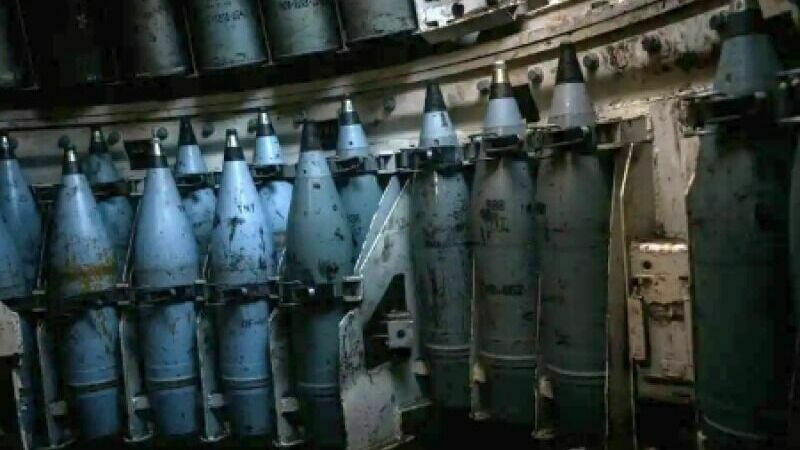
The United States is taking ammunition for Ukraine from its warehouses in Israel and South Korea
Alexander Sychev
The storage facilities in South Korea were the first to be shaken, and now they are engaged in stocks located in Israel.
The United States has climbed into its bins in Israel and South Korea, as stocks in the States themselves have noticeably dried up, and American arms manufacturers are unable to keep up with the pace of hostilities in Ukraine. According to unverified information, until recently, Ukraine used about 90 thousand artillery ammunition per month, which is twice the production capacity of the United States and its European allies combined.
Recently, the Ukrainian artillery has been experiencing an acute shortage of ammunition, besides, it has switched mainly to Western artillery, since there are practically no Soviet-made guns and ammunition left. Therefore, Washington decided to use additional sources of supplies.
Officially, ammunition depots in Israel appeared in 1990. However, weapons began to be stored there already in 1973, after the Arab-Israeli war. Weapons that had been evacuated from Iraq during the hasty withdrawal of American forces were also brought here.
All weapons and ammunition are distributed in six different places, and what the size of the reserves is unknown today. Initially, military mobilization stocks in Israel (War Reserves Stock Allies-Israel or WRSA-I) were estimated in monetary terms at $ 100 million. In 2002, the contents of the warehouses grew to almost a billion dollars. In 2014, after the adoption of the law on strategic partnership between the United States and Israel, Washington increased them to about two billion dollars. As a result, the second largest stock of military equipment outside the United States is stored in American armories in Israel.
WRSA-I is considered a strategic reserve necessary for the operational security of American interests in the Middle East region and is under the jurisdiction of the European Command of the US Armed Forces. The Pentagon used them, in particular, for operations that the United States conducted in Afghanistan, Libya, Iraq, and now in Syria.
American ammunition depots are sometimes used by Israel. To do this, you need to get a special permission from the US Congress. In 2002, during the largest operation in the West Bank since the "Six-Day War", called the "Indestructible Rock", the Israeli army received 120-millimeter mortar rounds and 40-millimeter ammunition for grenade launchers from American warehouses. The Israelis also used the stocks in warehouses in 2006, during clashes with paramilitary units of the Lebanese organization Hezbollah, and in 2014, for an operation against the detachments of the Palestinian "Islamic Resistance Movement" (Hamas).
The status of a strategic reserve was also carried by US warehouses in South Korea, where they appeared after the "Korean War" in the 1950s. Today, they serve as a source of reliable ammunition for American troops stationed at 15 bases in South Korea in the event of an armed conflict with North Korea and China.
Arsenals in Israel and South Korea include various artillery ammunition, smart bombs, missiles, military vehicles and mobile military hospitals. In general, everything that may be required to conduct combat operations in any of the countries of the Middle East and Southeast Asia.
And now there was a need to transfer ammunition to a completely different region. Back in 2022, the US State Department held relevant negotiations with the Israeli government on the seizure and shipment to Ukraine of about 300 thousand 155-millimeter shells. A little earlier, a similar topic was raised in Seoul – the Pentagon wanted to take out 100 thousand shells.
The negotiations were not difficult, but the conversation touched on a sensitive topic for both countries, and we had to show flexibility. Both the Israeli and South Korean governments are trying to adhere to the policy of not providing lethal weapons to Kiev, but Israel, in fact, had no formal rights to obstruct the transfer of American property.
In the case of South Korea, the situation is somewhat more delicate, but they quickly found a solution there. The fact is that ammunition produced by local companies is stored in South Korean warehouses, and they are branded R.O.K. – the Republic of Korea. But Seoul easily agreed to the following option – Washington buys Korean shells and uses them to replenish American stocks in other countries, from which, in turn, it will take shells for Ukraine.
"The United States is making up for the shortage of ammunition from its stocks in other regions. A dubious decision," says Michael Kofman, director of the Russia studies program at the Center for a New American Security at the CNA Corporation Research Institute. "This means that the United States is increasing risks in other places important for its security".